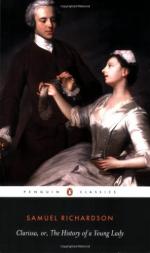I shall soon, I hope, pay my compliments to the dear lady in person: so have nothing to add, but that I am
Your old mad Playfellow and Cousin,
Charlotte Montague.
***
The women having read the copies of these two letters, I thought that I might then threaten and swagger—’But very little heart have I, said I, to encourage such a visit from Lady Betty and Miss Montague to my spouse. For after all, I am tired out with her strange ways. She is not what she was, and (as I told her in your hearing, Ladies) I will leave this plaguy island, though the place of my birth, and though the stake I have in it is very considerable, and go and reside in France or Italy, and never think of myself as a married man, nor live like one.’
O dear! said one.
That would be a sad thing! said the other.
Nay, Madam, [turning to Mrs. Moore,]—Indeed, Madam, [to Miss Rawlins,]— I am quite desperate. I can no longer bear such usage. I have had the good fortune to be favoured by the smiles of very fine ladies, though I say it [and I looked very modest] both abroad and at home—[Thou knowest this to be true, Jack]. With regard to my spouse here, I have but one hope left, (for as to the reconciliation with her friends, I left, I scorn them all too much to value that, but for her sake,) and that was, that if it pleased God to bless us with children, she might entirely recover her usual serenity; and we might then be happy. But the reconciliation her heart was so much set upon, is now, as I hinted before, entirely hopeless—made so, by this rash step of her’s, and by the rash temper she is in; since (as you will believe) her brother and sister, when they come to know it, will make a fine handle of it against us both;—affecting, as they do at present, to disbelieve our marriage— and the dear creature herself too ready to countenance such a disbelief —as nothing more than the ceremony—as nothing more—hem!—as nothing more than the ceremony—
Here, as thou wilt perceive, I was bashful; for Miss Rawlins, by her preparatory primness, put me in mind that it was proper to be so—
I turned half round; then facing the fan-player, and the matron—you yourselves, Ladies, knew not what to believe till now, that I have told you our story; and I do assure you, that I shall not give myself the same trouble to convince people I hate; people from whom I neither expect nor desire any favour; and who are determined not to be convinced. And what, pray, must be the issue, when her uncle’s friend comes, although he seems to be a truly worthy man? It is not natural for him to say, ’To what purpose, Mr. Lovelace, should I endeavour to bring about a reconciliation between Mrs. Lovelace and her friends, by means of her elder uncle, when a good understanding is wanting between yourselves?’—A fair inference, Mrs. Moore!—A fair inference, Miss Rawlins.—And here is the unhappiness—till she is reconciled to them, this cursed oath, in her notion, is binding.




